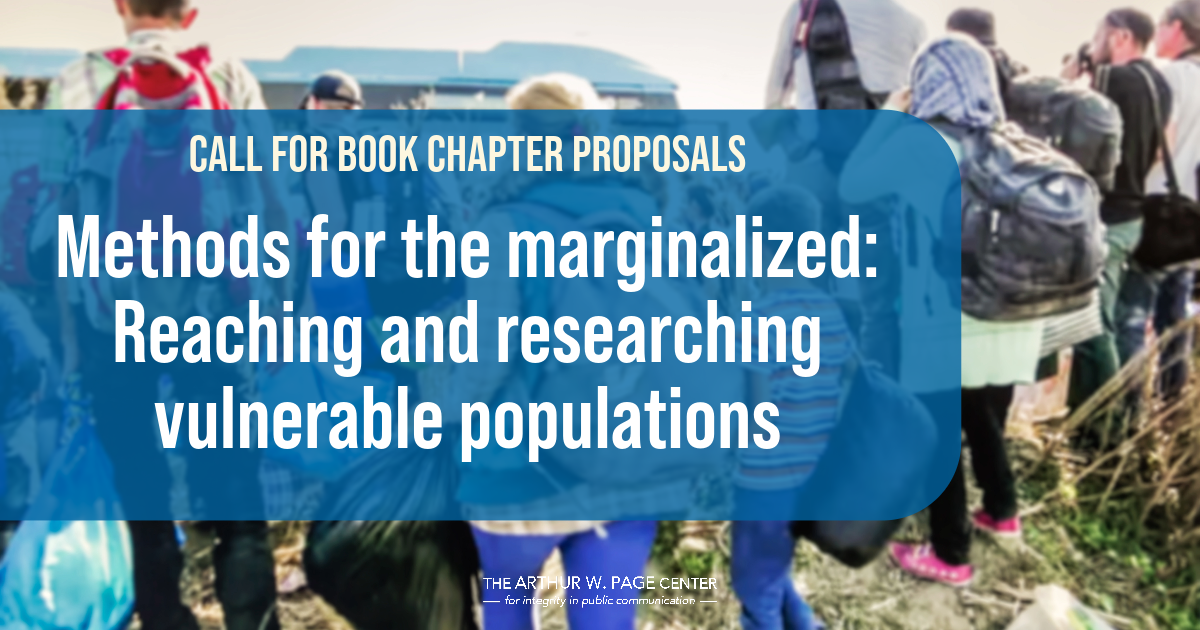Call for book chapter proposals: Reaching and researching vulnerable populations
October 24, 2023

Call for Book Chapter Proposals —
Methods for the Marginalized: Reaching and Researching Vulnerable Populations
Editors: Brian G. Smith, Ph.D. Brigham Young University and Staci B. Smith, Ph.D., Utah Valley University
Authors are invited to contribute chapter proposals to an upcoming edited collection on methodological considerations when researching or working with marginalized and vulnerable populations: Methods for the Marginalized: Reaching and Researching Vulnerable Populations.
The book’s chapters will explore the challenges, issues, and imperatives of working with vulnerable populations. This book project is supported by the Arthur W. Page Center at Penn State.

When studying marginalized populations, the goal is often to give voice to the voiceless and bridge the marginalized and the masses. While noble a cause this may be, many find themselves unprepared for the challenges of studying or working with populations that may be outside their personal expectations and experiences, affecting the ability to accurately represent the lived experiences of the marginalized and the vulnerable.
In fact, research has shown that marginalized communities are often subordinated by the researcher or practitioner (Vrikki & Malik, 2019) through a savior-oriented rhetoric (Irom, B., Bora, P. & Gibbons, S., 2023). To complicate the issue, research method texts don’t often provide sufficient instruction on overcoming such issues. Most only feature a short overview of vulnerable populations with minimum advice on working with them. For example, a commonly used text on methods features only one paragraph of instruction on vulnerable groups, including the imperative to “not act coercively to gain consent” (Lindlof & Taylor, 2019, p. 161). More extensive instruction is needed in both research and practice.
The purpose of this edited volume is to prepare researchers and practitioners to represent the lived experiences of the marginalized and vulnerable. Chapters will outline the lessons gleaned from working with and studying marginalized and vulnerable populations with a focus on imperatives for research and practice. Appropriate groups for this book include, but are not limited to: Minorities, LGBTQ+, Immigrants and Refugees, Children, Homeless, Physically or Mentally Impaired, Medical patients, and anyone facing discrimination of any type, including gender, sexuality, race, and socioeconomic status. Studies on activism, diversity, equity, and inclusion, and social movements may be especially appropriate for this book, though a variety of methods and subject areas are welcome!
Submissions to this edited volume should not be new or unfinished studies, but rather reflections on studies already conducted.
Submitters should consider the methodological lessons learned in the research, putting the focus on method instruction and practical imperatives while using the research study as the context, rather than on a discussion of the research findings.
Discussions may include, but are NOT limited to:
► Recruiting methods and considerations
► Gaining access and community acceptance
► Preparing for fieldwork, bridging experience deficits
► Working with gatekeepers and building validity
► Bridging linguistic or cultural differences
► Communication challenges and imperatives
► Questions of sampling and ample representation
► Working with support organizations and institutions
► Data collection accommodations
► Evaluating and assessing needs
► Alterations to methodological tools or practices
► Compensation challenges and pitfalls
► Lessons for avoiding bias
► Data interpretation, member checks and representation
► Ethics in data collection or practice
► Study or work approval challenges (i.e. Institutional, IRB, Organizational)
► Success and/or failures contextualized in theory or literature
Chapters will follow the following format:
a) Introduction of the population and challenge
b) Summary of the study
c) Discussion of methodological considerations (including appropriate citations)
Methods for the Marginalized is a book designed for teaching research methods at the undergraduate and graduate levels, as well as for training managers, practitioners, and volunteers for ethical and effective work with marginalized communities.
Chapter proposals from scholars and practitioners, alike, are welcome. For questions of fit, please email the editors Brian Smith and Staci Smith at marginalmethods@gmail.com.
Authors will receive a $1,000 honorarium from the Arthur W. Page Center for accepted chapters. Payments will be processed following the final chapter submission.
Please submit a chapter proposal of about 1-2 pages and a CV (in one document) to the Page Center via the Scholastica submission page by January 3, 2024. Proposals should 1) Explain the overall argument or point of the chapter, 2) Describe the research and population examined, and 3) Explain the chapter’s contribution to methods or working with vulnerable/marginalized populations. Authors will be notified of proposal acceptance by January 15, 2024. Full chapters of about 7,000 words (excluding references) will be due by June 1, 2024.
Irom, B., Borah, P., & Gibbons, S. (2023). The Rohingya refugee crisis: A social semiotic study of visuals in The New York Times and The Washington Post. Journalism & Mass Communication Quarterly, 100(3), pp. 550-568.
Lindlof, T. R., & Taylor, B. C. (2019). Qualitative communication research methods (4th edition). Thousand Oaks, California: Sage.
Vrikki, P. & Malik, S. (2019). Voicing lived-experience and anti-racism: Podcasting as a space at the margins for subaltern counterpublics. Popular Communication, 17(4), pp. 273-287.

